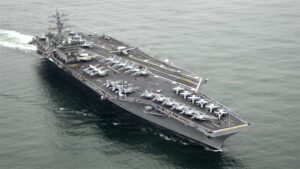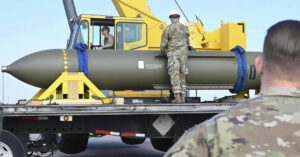The Saudis have relied upon the US for military protections for years, but as the US reduces its naval presence in the Persian Gulf, Saudi Arabia will have to find those protections elsewhere.
As the world’s largest oil exporter, Saudi Arabia has learned a few tricks to curry favor from different countries. Their most recent endeavor is accepting the Chinese Yuan as payment for a few hundred million barrels of oil…and that’s not an insignificant amount.
This move isn’t happening because the Saudis are worried about de-dollarization; it’s solely a move to win the Chinese over and establish a new external military guarantee. Still, this remains the only meaningful shift away from the USD, even though it’s from one country, for one commodity, and for one reason.
I’ve said it before, and I’ll say it again…the US Dollar ain’t going nowhere.
Prefer to read the transcript of the video? Click here
Here at Zeihan On Geopolitics we select a single charity to sponsor. We have two criteria:
First, we look across the world and use our skill sets to identify where the needs are most acute. Second, we look for an institution with preexisting networks for both materials gathering and aid distribution. That way we know every cent of our donation is not simply going directly to where help is needed most, but our donations serve as a force multiplier for a system already in existence. Then we give what we can.
Today, our chosen charity is a group called Medshare, which provides emergency medical services to communities in need, with a very heavy emphasis on locations facing acute crises. Medshare operates right in the thick of it. Until future notice, every cent we earn from every book we sell in every format through every retailer is going to Medshare’s Ukraine fund.
And then there’s you.
Our newsletters and videologues are not only free, they will always be free. We also will never share your contact information with anyone. All we ask is that if you find one of our releases in any way useful, that you make a donation to Medshare. Over one third of Ukraine’s pre-war population has either been forced from their homes, kidnapped and shipped to Russia, or is trying to survive in occupied lands. This is our way to help who we can. Please, join us.
CLICK HERE TO SUPPORT MEDSHARE’S UKRAINE FUND
CLICK HERE TO SUPPORT MEDSHARE’S EFFORTS GLOBALLY
TRANSCIPT
Alright. So the country that matters here, the only country that, in my opinion, is doing anything meaningful when it comes to moving from the dollar to something else. Is Saudi Arabia. Now Saudi is the world’s largest oil exporter, and they have started to accept payment from a number of Chinese government entities in yuan. And we’re talking here about, you know, a few hundred million dollars of cargo. So it’s hardly an insignificant issue. There’s no sign that they’re changing the reserves. And I wouldn’t expect that to happen because there’s a specific rationale here.
Now, the Saudis military on paper is great. They’ve got a lot of top notch equipment, but they have demonstrated over and over and over in recent decades that the Saudi military is incapable of operating its own equipment at scale, much less in any sort of coordinated manner. I mean, they can fly their planes and bomb things, and that’s about it. They have always, since their independence, relied on an external security guarantor in order to keep them alive. At first that was the Brits. And for the last several decades, especially under globalization, it has been the Americans. Now, the Saudis think a little bit differently. They basically have modeled themselves off of a medieval fiefdom. And so they think that bribes work really well in order to get what you want. This is one of the reasons why they got along so well with former American President Donald Trump. They saw the world through basically the same lens when it came to operating procedures.
So what they’ve done with the United States is they’ve bought a number of refineries on the U.S. Gulf Coast and shipped crude from Saudi Arabia to the U.S. Gulf Coast. And if there’s a time when the Americans look like they might be facing high energy prices or some pressure in the market, they sail additional cargoes and just let them park off coast until they’re called for. Now, it’s not like the United States, you know, thinks this is bad thing, but the United States gets the vast, vast, vast majority of its oil always has from the Western Hemisphere, with traditionally Canada and Mexico being our largest suppliers. Now, of course, with the shale revolution of the last 15 years, the United States is a net exporter. So the Saudi angle here is very, very small from an American point of view. But for the Saudis, this was never about the economics. It was about currying favor with the guy who’s supposed to defend you. Wellll, in the last few years, the United States has moved more and more of its forces out of the Persian Gulf, and we no longer even have a carrier group that’s there on a regular basis. So the Saudis are a little scared. They are concerned that without the Americans guaranteeing their security, that they’re screwed. And, you know, that’s a reasonable position. So they’ve been looking about for a replacement and they’re discovering that there isn’t a really good, clean one.
The French and the Brits could theoretically project power into the Persian Gulf, but definitely not as reliably as the United States. Turkey certainly could, but they would have to conquer Iraq first. And, you know, the Saudis have a lot of opinions on a lot of things going on in Iraq, but they’d really rather not have a regional superpower right on their border. India is probably in the long run the most likely outcome, but they’re not Muslim. So the Indians tendency to meddle in political events in places where they have military forces, especially in like Afghanistan, has really soured the Saudis. Japan’s a possibility, but Iran has other options as well. Most notably, it has gotten in bed with the United States and can access the energy of the Western Hemisphere. That just leaves China. Now, the Saudis aren’t all that hot on China. The Chinese navy really can’t project power, and the Chinese have no experience projecting power and military terms beyond their own neighborhood, much less going the 5000 miles it would take to get to the Persian Gulf. There’s also low confidence in Saudi Arabia that if a fight broke out that the Chinese would side with the Saudis against their primary regional rival, Iran. But if there’s one thing the Saudis have, it’s money to spare. So they have gone into China and bought up a few refineries, entered joint ventures with Chinese state energy firms, and are shipping crude to China like they used to ship it to the United States. Now, from the Saudi point of view, this might actually work better in terms of currying favor than it ever did with the Americans, because the Chinese actually need the crude they import three quarters of their total, of which roughly three quarters comes from Africa and the Persian Gulf. And so they’re paying for that in Yuan and in order specifically in their mindset to bribe the Chinese to come to their aid when the rubber hits the road. This is not an economic decision. This is a political decision being made not because they don’t like the dollar, but because they think the dollar doesn’t give them the military guarantees that they thought it once did. So this is Saudi making the decision because of military strategy as shaped by their own culture, not because they think the U.S. dollar is going anywhere.
But still, this is the only example I’ve seen out there of a meaningful shift away from the dollar. And it’s only for trade with one country for one commodity. Alright. That’s it for me.








